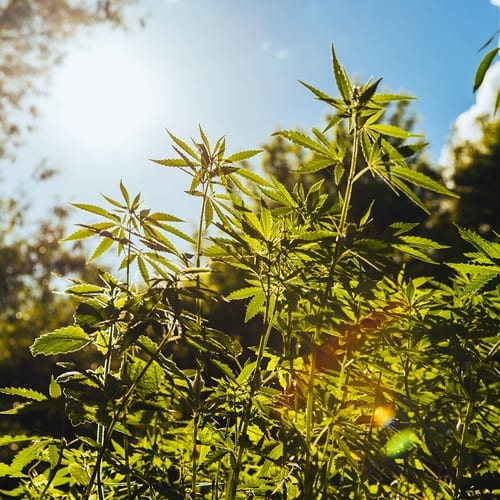
Broome County, New York, would like to welcome you to the site of Canopy Growth’s future hemp industrial park, a multimillion-dollar facility that local leaders believe can spark industry and farming—and thus jobs—in the hard-pressed upstate region.
The cannabis company, based in Canada, announced the location on April 29, settling on a 308,000-square-foot space that was the former home of Felchar Manufacturing Corporation. Canopy Growth started looking at locations in the area late last year, after the 2018 Farm Bill legalized hemp. It will process and make products out of hemp-derived cannabinoids at the facilities.
Such hemp industrial parks have been a longtime goal for Geoff Whaling, a hemp advocate, who recently joined Canopy Growth when it acquired his Pennsylvania-based hemp company, AgriNext USA, in March. The parks, Whaling told Cannabis Wire, can be a hub of processing plants, decortication facilities, harvesting equipment businesses, and other industry-related companies that can work together to build a hemp industry from the ground up.
Whaling said he was approached by Canopy once before, but at that time he wanted to focus on getting hemp federally legalized before joining any company. Then, as the Farm Bill got closer to passage, Canopy reached out to him again, “and asked, ‘When are we growing hemp together?’” Whaling said, “I could not think of a better company.”
Broome County is in the south-central part of New York State, bordering Pennsylvania, with a population of more than 190,000. Officials worked hard to bring Canopy to the area, which has cheap real estate and a readily available workforce. “I spent a lot of time working to introduce Canopy to the community and really sell them on what Broome County has to offer,” said county executive Jason Garnar. “We have these huge 300,000, 400,000 sq. feet facilities that they need for their processing facilities, we have the workforce that can do it.”
A ‘Shot In The Arm’
Once home to IBM, Endicott-Johnson Shoe Company—formerly one of the largest shoe manufacturers in the country—and a thriving agricultural economy, Broome County, like the rest of upstate New York, has struggled for years to grow economically. Today, Broome County has an unemployment rate of 4.9 percent, well above the national rate and a median household income of $49,064, below the national median income.
Leaders now see a big opportunity in legal hemp, which has been championed by New York State Assemblywoman Donna Lupardo, who was instrumental in the legalization of hemp in New York in 2015. “I’ve been aware of hemp and its implications for a long, long, long time,” Lupardo told Cannabis Wire. “I’ve also been aware that it had been really unfairly lumped in with the overall war on drugs.”
Lupardo said that in addition to bringing the “multi-use, fabulous plant” back into production, she also wanted to help put abandoned farmland and manufacturing buildings back into use. Canopy’s investment, said Lupardo and Garnar, will not only create hundreds of jobs at its processing facility, but the company’s plans to locally source hemp will also provide opportunities to the region’s struggling farmers.
“It’s a real shot in the arm for farmers in the community,” said Garnar, adding that they would now “have a really nice cash crop.”
Nationally, hemp is seen as a lucrative alternative to dairy and traditional staple crops such as corn and soybeans, whose prices have been falling for years. In fact, hemp acreage grew by more than 200 percent from 2017 to 2018 in the United States. Whaling, who has worked with numerous farmer organizations in the US and sits on the board of the Pennsylvania chapter of the National Farmers Union, said he has seen hemp revive small family farms.
“That is one of the things we experienced in Canada—generations who thought there was no future in farming adopted hemp,” said Whaling, “Not only have they gone home to work on family farms—they bought it, and then they expanded it.”
Multiple parallels have been drawn between Canopy’s entry into upstate New York with its operations in Smiths Falls, Ontario, a struggling small town in Canada, where the company converted an abandoned Hershey’s chocolate plant into a cannabis production and processing facility, employing more than 1,000 people.
Lupardo and Garnar also hope that Canopy’s investment will help persuade other hemp industry-related businesses, such as textiles and automobiles, to invest in the area. Whaling, too, sees adjacent industrial opportunity. “The industrial hemp side of this industry is a trillion dollar opportunity,” he said, “Anything and everything we touch in our day-to-day lives—we need places to live, we need clothing to wear, we need body care items, we need tools, we need automobiles—all of that can be accomplished with hemp.”
Research is already underway at SUNY New Paltz to identify which type of hemp fibers can be suitable for different industrial applications. For example, the strongest and stiffest fibers could be separated and used to make automobile parts, Jared Nelson, who is leading the research at the college, told Cannabis Wire.
Causes for Concern
Some in Broome County worry that continued confusion between hemp and marijuana might be a source of some resistance from community members toward the expanding hemp industry. But Garnar believes that when people are educated about the difference, that will no longer be a concern.
Andrew M. Rosner, who works with Source Botanica, a small organic hemp production and processing company in nearby Sullivan county, said that his company experienced some initial community resistance. But things changed when the company engaged in an educational campaign.
“It’s amazing to actually have the conversations at the beginning of summer and hear the resistance and then to hear how those voices of resistance started to change to acceptance and encouragement by the end,” said Rosner.
But he points out that not everyone upstate is excited at the prospect of large companies like Canopy coming in. Existing small cannabis businesses are worried about the competition they now have to face—and the possible oversupply of CBD, which could drive down prices. “When very large players come into the market, it could negatively impact small businesses if there aren’t ways in which the state has considered to encourage business development at various scales,” said Rosner.
Lupardo cited Canopy founder and CEO Bruce Linton’s comments that they hope to “create an ecosystem that inspires new entrepreneurs and generates more economic stimulus than a single company can offer” as an encouraging sign.
“They see themselves as a partner. And they’re coming into our state not asking for economic stimulus money, they’re not asking for incentives,” said Lupardo. “We fully expect to support all size businesses, including small farm businesses.”
Garnar, too, says the new industry is bringing a lot of excitement. “We haven’t seen this before,” said Garnar. “It is not typical in our community to see a whole industry descend into our county and buy up buildings and start working with local farmers.”
Source: CannabisWire.com





